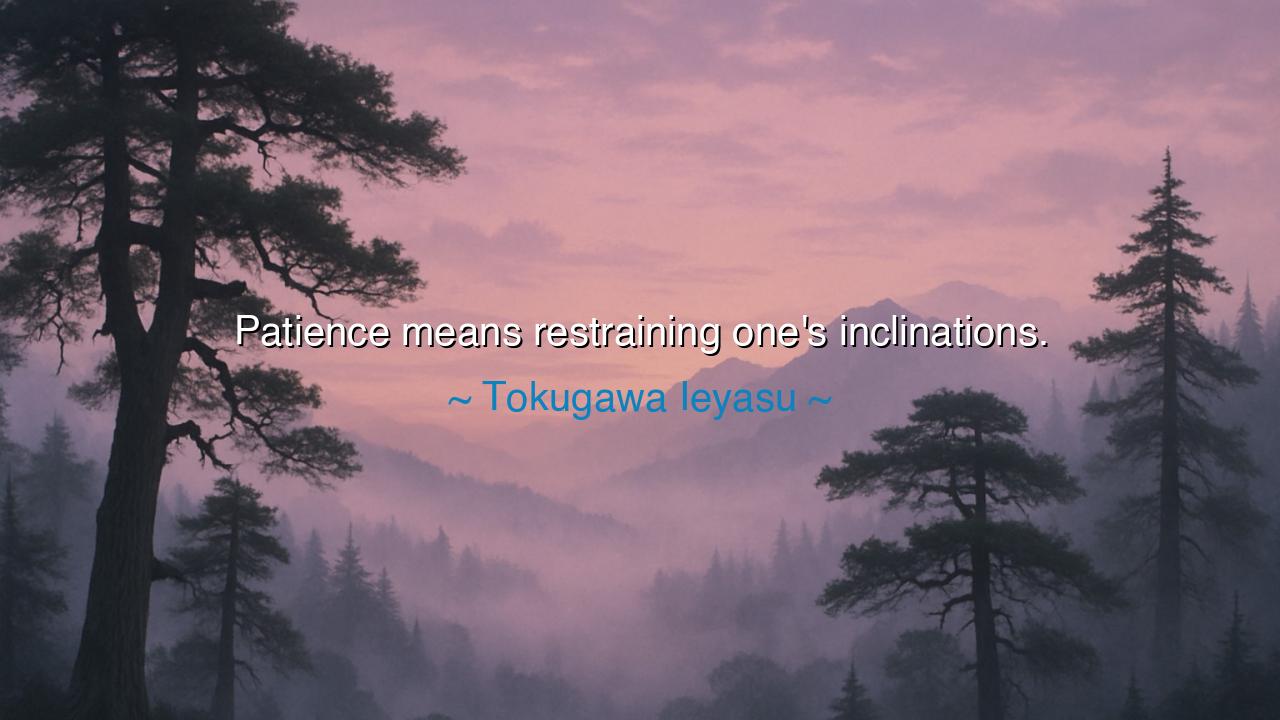
Patience means restraining one's inclinations.






The shogun Tokugawa Ieyasu, who forged unity from centuries of chaos in Japan, once spoke these words: “Patience means restraining one’s inclinations.” In this utterance lies a wisdom carved not from idle thought, but from a lifetime of battle, endurance, and self-mastery. For to restrain one’s inclinations is to master the self, and to master the self is to master destiny. The world is filled with those who rush after desire, who are slaves to impulse and anger. But the one who can restrain his hand, his tongue, his hunger, and his pride—such a person wields a power greater than armies.
When Ieyasu speaks of patience, he does not mean the idle waiting of a passive soul. He means the active discipline of holding back when the heart screams to leap forward. It is easy to act on impulse; it is hard to wait until the right moment. Yet it is in the waiting that true strength is revealed. Just as a bow must be drawn slowly and held firm before releasing the arrow, so too must we restrain our inclinations before releasing our actions. Only then can they strike with precision and purpose.
The life of Tokugawa Ieyasu himself is a mirror of his words. Born into a turbulent age when warlords devoured one another for power, he learned early that survival required not only courage but restraint. Many times, he yielded when his pride urged him to fight. He bent, where others broke. When rivals perished through reckless ambition, Ieyasu endured. Decade by decade, he grew stronger, until at last he rose above them all, uniting Japan under his rule and establishing a peace that lasted for over two hundred years. His triumph was not won by force of arms alone, but by patience, by restraining his inclinations until the moment was ripe.
History holds other examples. Consider George Washington at Valley Forge, where hunger and frost threatened to break the American Revolution. Many voices urged him to act rashly, to strike when strength was lacking. Yet Washington restrained his inclinations, held his army together, and waited until fortune and preparation aligned. His patience preserved the cause of liberty. Here again, we see that the greatest victories often belong not to the swift, but to the steadfast.
To restrain inclinations is to resist the temptations of the moment: the anger that drives us to foolish words, the greed that drives us to unjust gain, the pride that blinds us to wisdom. These are the enemies within, far more dangerous than enemies without. A man may conquer a thousand foes, yet if he cannot conquer himself, he is already defeated. But the one who practices restraint becomes unshakable, a fortress against the storms of desire.
The lesson for us is plain. When anger rises, restrain it. When temptation whispers, resist it. When the heart urges haste, pause and see more clearly. This is the way of patience—not weakness, but the strength of holding the reins of one’s soul. By doing so, we avoid regrets, we act with wisdom, and we move with purpose. The world belongs not to those who burn quickly like dry straw, but to those who endure like oak through winter and storm.
Therefore, my counsel is this: practice restraint each day. In speech, be slow to respond; in action, consider the consequences; in desire, remember what is truly lasting. Let the fire within you burn steadily, not wildly. For in mastering your inclinations, you master your life. As Tokugawa Ieyasu taught by word and by deed, patience is not the absence of action—it is the art of waiting for the right action at the right time.
So remember these words, children of the future: “Patience means restraining one’s inclinations.” Hold them close, for in them lies the secret of strength. To rule yourself is to rule all things. To restrain your impulses is to walk the path of the wise. And in this way, you too may shape not only your own destiny, but the destiny of those who come after you.






AAdministratorAdministrator
Welcome, honored guests. Please leave a comment, we will respond soon